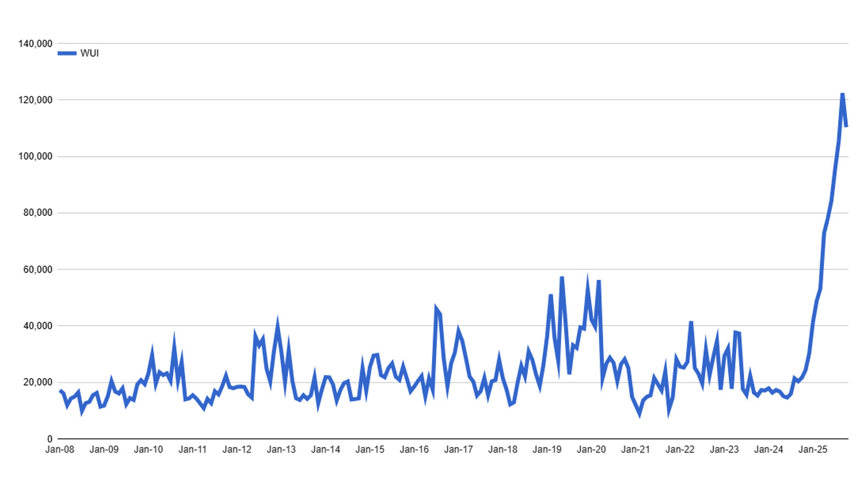IVA's President: Some thoughts on Uncertainty
Dear IVA Friends,
Quality. Integrity. Courage. These are the watchwords of the world's first academy of engineering sciences, IVA. These words have meaning, and indeed they were one of the reasons I joined IVA as president last year. I see these qualities in practice here every day. If I were to add anything, it would be responsibility. At a time when knowledge and science are being questioned and pure opinion is given equal weight to facts, an academy such as IVA has a special responsibility. It is fundamental that the advice and recommendations we provide are based on scientific evidence. Decision-makers should always be confident that what comes from IVA is of the highest standard.
The International Monetary Fund, Stanford University, and the US research organization NBER (National Bureau of Economic Research) recently its World Uncertainty Index (WUI). The WUI is a measure of how often analysts from the Economist Intelligence Unit (EIU – a sister company of The Economist) mention uncertainty in their reports, which serves as a proxy for perceived global and national uncertainty. The index is calculated by determining the percentage share of the word “uncertainty” or its variants in the recurring country reports and then scaling this by multiplying it by 1,000,000. The WUI has been published four times a year since 2008, giving us a solid series to reflect on.
The index has remained steady at an average of 30,000 over the past 17 years, with a temporary peak of 50,000 during the pandemic years. The latest index from October shows the remarkable figure of 122,000. This says something about the exceptional times we live in. The world has rarely been, or felt, more uncertain than today.
An uncertain world affects both businesses and individuals, but also countries’ independence and capacity to act. Uncertainty breeds speculation, conspiracy theories, and polarizing opinions, but it can also explain why even scientifically based analyses can result in different, and sometimes diametrically opposed, conclusions and recommendations.
The responsibility to take ownership of our own future, as I have written before, is particularly important in times of great uncertainty.
On that theme, I would like to once again highlight IVA's initiative “Swedish Futures,” which sets out a vision for Sweden as a world-leading technology and innovation country in 2035. I am delighted and grateful for the tremendous response and commitment the initiative has received, not least from the large group of funding providers who have participated in and supported the project.
Earlier this fall, IVA kicked off this project with an analysis of Sweden's current global position in strategically important technologies. The report has generated great interest. It is being referenced in the media and discussed at board meetings and in academic circles, which is very gratifying and exactly what we had hoped to achieve.
While doesn’t provide all the answers and it requires further contextualization, the report is an important start to a more informed and nuanced conversation about where we stand today as we create a plan for the future. Above all, it raises awareness and directs attention to the importance of technology for Sweden's future development and autonomy. Before the end of the year, we look forward to presenting a more in-depth analysis of the measures needed to avoid losing ground in areas of technology important for Sweden's future. Hopefully, we can jointly dispel some of the uncertainty through constructive and well-founded efforts.

Thank you for being part of IVA's network!
/Professor Sylvia Schwaag Serger, President IVA
Some thoughts from IVA´s President are published in Swedish in IVA's newsletter, and in English on IVA's LinkedIn.




